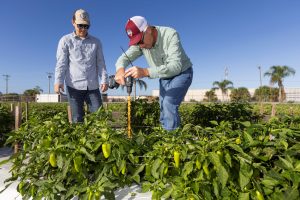Sakata Seed America Inc. shares the same water as urban residents in Southwest Florida. So, farm manager Cory Dombrowski wanted to see if he could irrigate more efficiently at the research farm east of Fort Myers.
He did. With the help of UF/IFAS Extension, Sakata is using 40% less water than it was two years ago.
“I was new to managing irrigation on a South Florida farm,” Dombrowski said. “So, I wanted to know what was going on, beyond feeling the soil – judging the moisture by hand.”
Fortunately, he had met Craig Frey, a multi-county vegetable agent and director of UF/IFAS Extension in neighboring Hendry County. He knew Frey could lend him soil moisture sensors to test and assess if they could be an effective tool in improving his water management.
The soil moisture sensors Dombrowski and Frey used go about 2 feet into the ground. They get average moisture readings for every 4 inches of soil and send that data to an app. In this case, that information goes to Dombrowski’s cellphone, and he uses the readings to gauge how much water to use on the farm.
Dombrowski has managed to reduce annual on-farm water use by 40%. While using less water, Dombrowski also sees other advantages to the soil moisture sensors.

“I noticed the root growth was better when we weren’t over-watering the plants, especially when they were young,” Dombrowski said. “We allowed the roots to develop more deeply in the soil.”
With improved root systems, he noticed nutrients weren’t leaching as much into the soil — another plus.
“So, we’re saving on fertilizer,” he said. “We’re saving on water. We pump our water from wells, so we’re saving electricity and diesel.”
The sensors also cost less than they might under normal circumstances because Frey and industry partners at BMP Logic connected Dombrowski with the Florida Department of Agriculture and Consumer Services (FDACS) Best Management Practices Cost Share Program, which reimbursed Sakata 75% of the costs of the sensors Dombrowski bought.
All these savings exemplify a partnership that many farms — and in this case, Sakata, a vegetable and flower seed company — enjoy with UF/IFAS Extension.
Frey is all too happy to help.
When he received the sensors – first from FDACS, then from UF/IFAS — Frey said his first goal was to get them in the ground on farms and see what he and the growers could learn.
“Every single time that I’m working with a new grower, they manage things a little bit differently, and we learn things together,” he said.

As Frey has continued to expand the use of soil moisture sensors with growers, he notices many agricultural producers overirrigate – but there’s a reason behind that approach.
“We keep the soil moisture wet because the downside of going dry is that you can lose a whole crop,” he said. “By using soil moisture sensors, you can dial that down a bit more and be a lot more precise in your irrigation management.”
In the early phases, Frey visited Sakata Seed fairly frequently. Recently, he and Dombrowski keep in touch by phone and Zoom meetings. Through Zoom, they can look at a dashboard to monitor water use at the research farm. Dombrowski passed along his knowledge to his farm staff.
“When Cory began to be excited about this and explain his changes to some of his staff, then I knew our collaboration was effective,” Frey said.
Dombrowski sees Sakata and its water savings fitting in with the rest of Southwest Florida’s desire to use water wisely. The company is, after all, part of the community.
“All of us that live here in Southwest Florida really love the water,” he said. “We all like to go fishing. We like to go kayaking. Water quality is an important issue to us. Also, we’re in an area experiencing rapid growth, and we’re all pulling out of the same aquifer. So, every little bit we can do to help all of us that live in Southwest Florida to use our fertilizer wisely, to conserve our water, to make sure we have a bright future here. That’s important to everybody that lives here.”
To continue preserving water, Dombrowski thanks Frey and looks forward to a fruitful future relationship.
“I think our relationship with UF/IFAS Extension is extremely valuable,” he said. “The agents are very accessible, and I’ve learned a lot on farming practices, weed control and irrigation, and I continue to learn. I’m looking forward to our relationship in the future to keep us up to date on the latest agricultural practices.”
###
ABOUT UF/IFAS
The mission of the University of Florida Institute of Food and Agricultural Sciences (UF/IFAS) is to develop knowledge relevant to agricultural, human and natural resources and to make that knowledge available to sustain and enhance the quality of human life. With more than a dozen research facilities, 67 county Extension offices, and award-winning students and faculty in the UF College of Agricultural and Life Sciences, UF/IFAS brings science-based solutions to the state’s agricultural and natural resources industries, and all Florida residents.
 2
2
